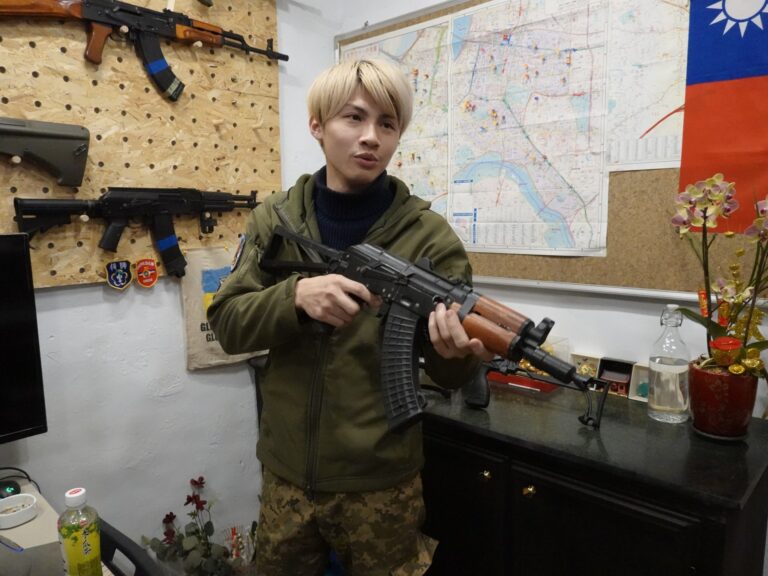Taipei, Taiwan – A missile strikes Taiwan’s capital, causing devastation to a once peaceful park.
Only a short time ago, pedestrians walked along paved roads lined with brick and stone buildings with sloping tiled roofs that dot this hilly landscape.
Now, torn limbs lie strewn across the blood-stained cobblestones, and everywhere the dying and injured writhe on the ground, screaming in pain and pleading for help.
Straight away, frantic emergency workers rushed to help, locating the most seriously injured, trying to staunch the bleeding from wounds and carry people to safety.
It looks like a battlefield, but it’s not a battlefield.
The blood and limbs are fake, the injured are uninjured actors, and the paramedics are trainees.
This scene was simulated by the civil defense group Kuma Academy in late January.
The training lasted eight hours and included training on how to respond to air defense alerts, use the surrounding terrain as cover and avoid detection by hostile forces.
“Today’s large-scale exercises simulate real-life scenarios to give students practical experience,” explains Chen Ying, a lecturer at Kuma Academy.

There were 120 participants, all of whom had completed basic first aid and disaster response training.
One participant said he initially joined the program to understand what it would be like if a disaster or war occurred. “If something like that were to happen, we need to be prepared,” he said.
“You’ll be able to cope better emotionally and mentally.”
Kuma Academy has grown rapidly in recent years and now offers a wide range of courses and exercises, from cyber attacks and disinformation to cardiopulmonary resuscitation (CPR) and injury assessment.
The organization is part of a broader grassroots movement of Taiwanese civil defense groups that has spread across the island in recent years and seen large numbers of civilians take part in training.
Classes will be taught primarily in nonviolent forms of civilian preparedness.
“We leave the fighting to the Taiwanese military,” Ho Cheng-hui, an activist and co-founder of the Bear Academy, told Al Jazeera during one of the group’s training sessions.
Nonviolent training comes in many forms. Organizations like Kuma Academy organize realistic, large-scale training exercises that can involve 100 or more people at a time. Smaller, local groups hold civil defense assignments at local community centers, bringing people together to do physical training.
Courses include subjects like tying knots, first aid, stocking emergency supplies, packing an evacuation bag, making a tourniquet, etc. Another course focuses on civil defense in the virtual world, teaching participants how to counter online manipulation campaigns and distinguish factual information from misinformation and disinformation online.

All of the civil defense preparations are driven by concerns about China, said Chen Fangyu, an assistant professor in the political science department at Soochow University in Taipei.
“Taiwanese people are concerned that China will take aggressive actions against Taiwan,” he said.
Since the founding of the People’s Republic of China in 1949, the Chinese Communist Party (CCP) in Beijing has viewed the self-governing Taiwan (officially the Republic of China) as an integral part of China itself.
In 2022, Chinese President Xi Jinping said he would not rule out using force to bring the island under Communist Party control.
A Pew Research Center survey last year found that 66% of Taiwanese people consider Beijing’s power a major threat to Taiwan, while a 2023 poll by Taiwan’s Academia Sinica found that about 83% believe the threat from China has increased in recent years.
Their fears appear to be well-founded. On Thursday, China began two days of joint military drills with its army, navy, air force and rocket forces in the waters and airspace around Taiwan, which the Chinese military has framed as a deterrent against Taiwanese “separatists” and “external forces.”
US intelligence agencies have reportedly said President Xi Jinping has ordered the military to prepare for an invasion of Taiwan by 2027.
Ho, co-founder of Kuma Academy, said he, like many around him, was deeply concerned about China’s future actions toward Taiwan.
“I found that many Taiwanese civilians have the same concerns as me, but don’t know what to do or where to go about them,” Ho told Al Jazeera at a Kuma Academy training course in Taipei, which is why he co-founded the Kuma Academy in 2021.
But the growth of civil defense groups like Xiongmu is not welcomed by everyone in Taiwan. Some worry the groups are pushing Taiwan into a deeper conflict with China and putting the island at risk. Others see the new groups as a sign of the erosion of the state-controlled civil defense system and accuse the government of not doing enough to strengthen and expand the existing system.
Ho believes Taiwan’s civil defence situation is far from perfect, but he said at least more people are learning how to save lives from groups like his.
“We want to teach civilians how to protect themselves and each other so that when war comes, everyone is prepared.”

